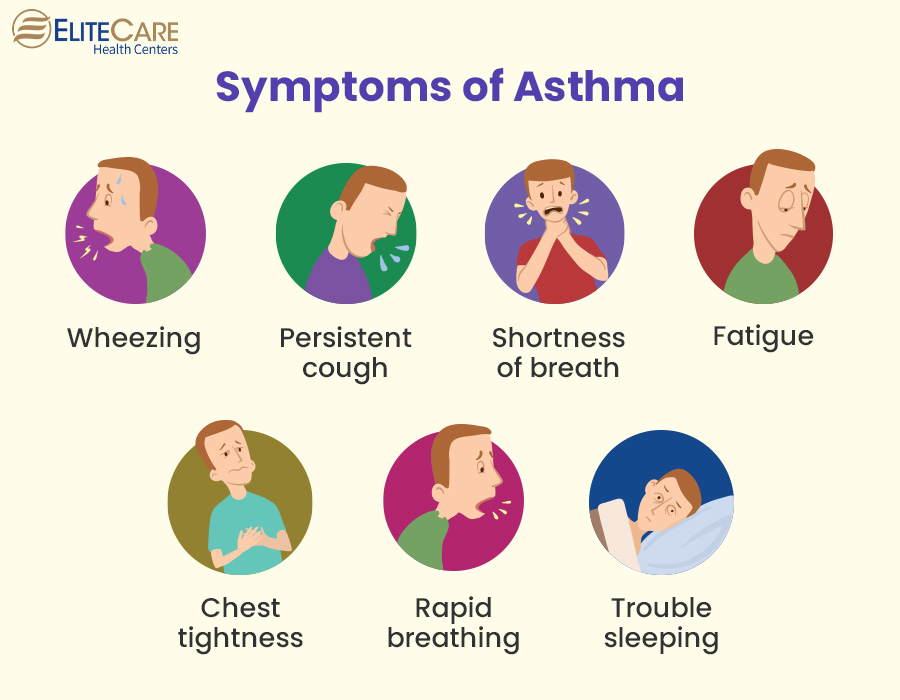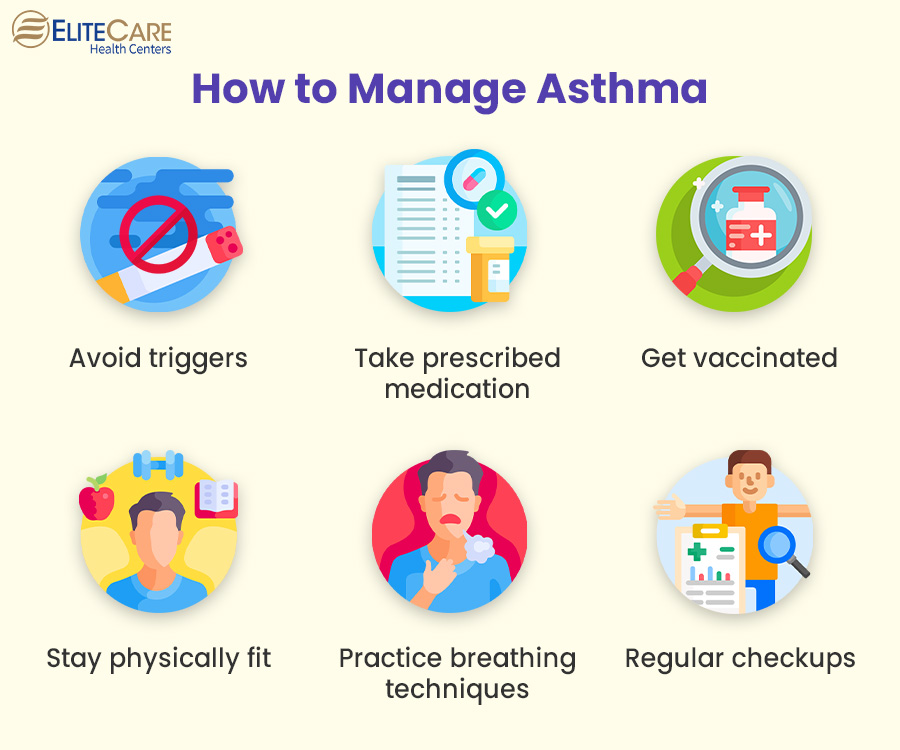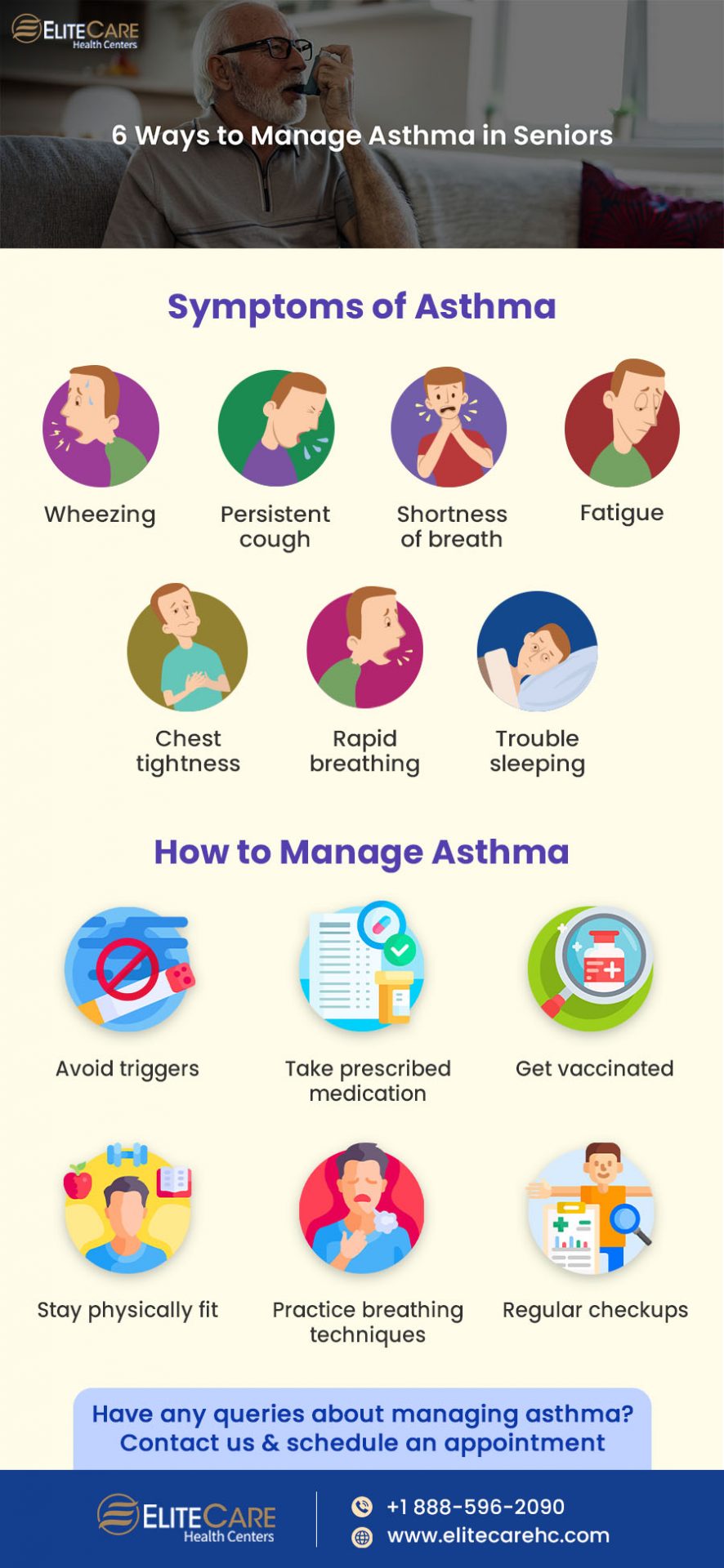
Asthma is a chronic respiratory condition in which airways become narrow due to inflammation, leading to symptoms such as wheezing, coughing, and difficulty breathing. This chronic issue affects people of all ages, but its impact is more severe on older adults. As reported by the Centers for Disease Control and Prevention (CDC)*, approximately 7.8% of older adults in the United States are currently suffering from asthma. The CDC also reports that seniors who are suffering from asthma have a higher rate of emergency department visits and hospitalizations for asthma-related complications. It happens due to their weakened immune system.
What triggers asthma? What are the symptoms of asthma attack? And how can the problem be managed? Read on to learn more.
Causes of Asthma
This chronic condition is a complex disease with multiple genetic and environmental factors that vary for most individuals. Although researchers are still trying to figure out the exact cause of asthma, a combination of the following factors can lead to the development of asthma.
1. Genetics
Asthma is hereditary and it tends to run in families, suggesting the presence of a genetic component to the disease.
2. Allergens
Exposure to certain environmental factors, such as air pollutants, pollens, etc. can escalate existing asthma.
3. Exposure to chemicals
Those who are frequently in contact with dust, fumes, and certain toxic chemicals in their workplace can develop asthma more easily.
4. Smoking
Asthma can be triggered by smoking and exposure to secondhand smoke.
5. Respiratory infections
Frequent respiratory infections, such as colds and flu, can trigger asthma or exacerbate the condition.
6. Cold weather
Breathing cold air can constrict the airways and escalate asthma symptoms.
However, asthma may be also triggered by a few other less commonly known factors like stress and obesity. If a senior has asthma, it is crucial to be aware of what triggers the problem and take necessary steps to minimize their exposure.
Read More: Six Ways to Help Seniors Cope with Stress
Symptoms of Asthma Attack

Asthma symptoms can vary in severity and their frequency can differ from person to person. Some of the common symptoms of asthma attack are as follows:
- Wheezing with a whistling sound
- Persistent cough
- Shortness of breath
- Chest tightness
- Rapid breathing
- Fatigue
- Trouble sleeping
Asthma symptoms can range from mild, moderate to severe and may vary over time in terms of intensity. It is crucial to seek immediate medical attention from a senior care service if the elderly experience any of these symptoms or have difficulty managing their existing asthma symptoms.
How to Manage Asthma in Seniors

1. Avoid triggers
The first step in managing this chronic condition is to identify and avoid triggers that can cause symptoms to flare up. Some of the common triggers include pollen, dust mites, pet dander, mold, smoke (both first-hand and second hand), and air pollution.
Seniors or their caregivers can take the following steps to minimize their exposure to asthma triggers:
- Limit outdoor activities during peak pollen season that typically begins in the early spring.
- Wear scarves or masks to reduce the risk of contact with allergens.
- Keep the home clean and well-ventilated at all times using air purifiers.
- Do not step out in extreme weather conditions.
- Quit smoking and avoid secondhand smoke.
2. Take prescribed medication
Seniors should take their prescribed medication for asthma as directed by their primary care physicians. Doctors often recommend a combination of controlled medications that will help prevent symptoms and rescue medications to treat symptoms when they occur. Make sure to take both medications as prescribed by a provider to prevent symptoms from escalating.
3. Get vaccinated
Respiratory infections like the flu or pneumonia can cause inflammation in the airways, making it difficult to breathe. This inflammation can trigger asthma symptoms such as coughing, wheezing, and shortness of breath and cause additional stress on the immune system.
That is why getting vaccinated against the flu and pneumonia should be a priority for everyone, especially seniors. Individuals should also wash their hands frequently and avoid close contact with people who are sick.
4. Stay physically fit
Regular exercise and yoga practice can improve lung function, reduce inflammation, and strengthen the muscles involved in breathing. Thus, they can ultimately help to reduce asthma symptoms.
However, seniors suffering from asthma should avoid exercising in cold or dry conditions, which can eventually trigger symptoms. They should also carry a quick-relief inhaler (prescribed by doctor) with them during exercise or yoga practice in case there is a flare-up.
Regular exercise can help improve lung function and overall health in seniors. However, seniors with asthma should talk to their primary care physicians before starting an exercise program.
Read More: Five exercises that can enable seniors to stay balanced
5. Practice breathing techniques
Seniors with asthma can benefit from practicing deep breathing techniques, such as diaphragmatic breathing and pursed-lip breathing to improve lung function and reduce symptoms. Here’s a step-by-step guide to a simple deep breathing exercise that seniors can practice:
- Sit in a comfortable position and place your hands on your belly.
- Take a gentle, slow, deep breath through your nose, filling your belly with air. Remember to expand your belly with inhale, rather than your chest.
- Hold your breath for at least a few seconds, then slowly exhale through your mouth, pushing the air out of your system.
- It is recommended to practice deep breathing exercises at least once or twice a day for about 5 to 10 minutes each time.
Deep breathing techniques can be practiced daily, both as a standalone relaxation technique and as part of a regular exercise or yoga routine.
6. Do not miss regular checkups
Seniors should never delay or miss routine physical exams that include the asthma test, EKG test, etc. with their primary care physicians to monitor their symptoms and adjust their treatment plan accordingly. Regular checkups at health care centers can also help identify potential complications, such as lung infections or side effects from medication that can escalate the condition if not addressed on time.
Conclusion
Asthma can be a challenging condition to manage, particularly for seniors who may be suffering from multiple health issues. However, with the right approach, they can control their symptoms and continue to enjoy an active and healthy lifestyle. For any questions or concerns about asthma and how to manage it effectively, contact EliteCare Health Centers, one of the best medical clinics in Florida that provide senior care services. Visit your nearest health care center or call us to schedule an appointment with our providers for your annual physical exam.
* Have Asthma? Learn how you can improve your health and quality of life. (2023, February 28). Centers for Disease Control and Prevention.






